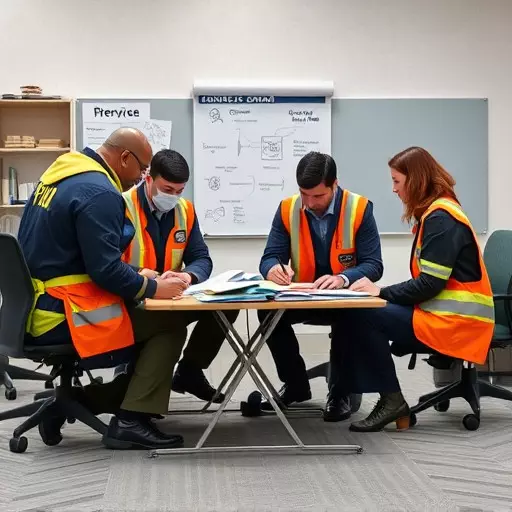Process Hazard Analysis (PHA) is a structured approach led by specialized pha facilitation experts to identify, assess, and manage risks within industrial processes. These experts utilize multidisciplinary teams and advanced pha facilitation tools to map complex systems, uncover potential hazards, and prioritize risks based on likelihood and consequences. By fostering open discussions and encouraging cross-functional participation, they strengthen safety cultures and drive continuous improvement. PHA techniques, including scenario tree analysis, fault tree analysis, and event sequence analysis, go beyond traditional risk assessment, enabling proactive management of rare but catastrophic events. Case studies show significant reductions in accidents and improvements in workplace safety through successful PHA implementations. Future trends in PHA leverage data analytics, machine learning, and digital simulation to transform safety management from reactive to predictive.
In today’s industrial landscape, Process Hazard Analysis (PHA) stands as a robust tool for enhancing safety management. This comprehensive guide delves into the multifaceted benefits of PHA implementation, highlighting its role in identifying and mitigating risks effectively. From understanding the core method to exploring advanced techniques, we dissect the value proposition of PHA facilitation experts and tools. We also scrutinize real-world success stories, revealing how strategic hazard identification techniques can transform safety culture. Get ready to unlock your organization’s safety potential.
- Understanding PHA (Process Hazard Analysis): An Overview of the Method
- The Role of Pha Facilitation Experts: Enhancing Safety Culture
- Unlocking Safety Potential: PHA Facilitation Tools and Techniques
- Effective Hazard Identification: Strategies Employed in PHA
- Benefits of PHA Implementation in Industrial Settings
- Real-World Success Stories: Case Studies of PHA Facilitation
- Future Trends: Advanced PHA Techniques for Proactive Safety Management
Understanding PHA (Process Hazard Analysis): An Overview of the Method

Process Hazard Analysis (PHA) is a systematic method used to identify, assess, and manage hazards within industrial processes. Facilitated by pha facilitation experts, this technique involves a multidisciplinary team that applies a structured approach to analyze complex systems. The process begins with gathering information about the facility, its operations, and historical data related to potential risks. Pha facilitation tools aid in this initial phase, helping to map out the system and identify potential hazards using various hazard identification techniques.
Once hazards are identified, the team prioritizes them based on their likelihood and potential consequences. This step ensures that resources are focused on addressing the most significant risks first. By combining technical expertise with a deep understanding of the facility’s operations, pha facilitation experts guide the team through this process, ensuring comprehensive hazard assessment and effective risk management strategies.
The Role of Pha Facilitation Experts: Enhancing Safety Culture

PHA facilitation experts play a pivotal role in enhancing safety culture within organizations. These experts are equipped with specialized knowledge and skills to guide teams through various hazard identification techniques, ensuring a comprehensive and systematic approach to risk assessment. They provide an objective perspective, facilitating open discussions and encouraging active participation from all stakeholders.
Through the deployment of PHA facilitation tools, these experts help in breaking down complex processes into manageable components, making it easier for employees to identify potential hazards and implement effective mitigation strategies. By fostering a collaborative environment, they empower teams to take ownership of safety, driving continuous improvement and creating a culture where proactive risk management is the norm rather than the exception.
Unlocking Safety Potential: PHA Facilitation Tools and Techniques

Unlocking Safety Potential: PHA Facilitation Tools and Techniques
PHA (Process Hazard Analysis) facilitation experts employ a diverse set of tools to streamline hazard identification techniques, making safety management more efficient and effective. These tools are designed to break down complex systems into manageable components, enabling in-depth analysis of potential hazards and their consequences. By utilizing specialized methodologies, PHA facilitators guide organizations through a structured process, ensuring comprehensive risk assessment and informed decision-making.
The expertise of PHA facilitation experts lies in their ability to tailor these tools to unique operational contexts, addressing specific industry challenges. They facilitate collaborative sessions where cross-functional teams actively participate in identifying hazards, evaluating risks, and implementing mitigating strategies. This participatory approach not only enhances knowledge sharing but also fosters a culture of safety consciousness across the organization, ultimately unlocking its full safety potential.
Effective Hazard Identification: Strategies Employed in PHA

Effective Hazard Identification is a cornerstone of any robust safety management system, and Process Hazard Analysis (PHA) stands out as a powerful methodology for achieving this. PHA facilitation experts employ a comprehensive set of tools and techniques to uncover potential hazards within industrial processes. These strategies involve detailed process walks, where facilitators meticulously examine every step, equipment, and potential interaction, identifying risks that might be overlooked during routine inspections.
The process includes the use of specialized hazard identification techniques, such as What-If scenarios, Failure Modes and Effects Analysis (FMEA), and Event Tree Analysis. These tools help to visualize and quantify potential hazards, allowing for a deeper understanding of system vulnerabilities. By combining these methods, PHA facilitation experts can identify not only immediate risks but also latent hazards that could lead to catastrophic failures, ensuring a comprehensive approach to safety management.
Benefits of PHA Implementation in Industrial Settings

The implementation of Process Hazard Analysis (PHA) in industrial settings offers a multitude of benefits that significantly enhance safety management. PHA facilitation experts employ advanced tools and techniques, such as scenario tree analysis, fault tree analysis, and event sequence analysis, to systematically identify and evaluate potential hazards within complex industrial processes. These hazard identification techniques go beyond traditional risk assessment methods by considering not just what can go wrong but also how it might happen and the consequences involved.
By leveraging PHA facilitation tools, organizations can proactively manage risks rather than merely reacting to them. This proactive approach allows for the implementation of effective mitigations strategies, ensuring that even rare but catastrophic events are addressed. As a result, industrial facilities can operate more safely, efficiently, and in compliance with regulatory requirements. Moreover, continuous PHA practice fosters a culture of safety awareness among employees, empowering them to identify and address potential risks before they escalate.
Real-World Success Stories: Case Studies of PHA Facilitation

In the realm of safety management, Professional Hazard Analysis (PHA) has emerged as a game-changer, with numerous real-world success stories to back its effectiveness. Case studies from various industries highlight how PHA facilitation experts, armed with advanced tools and techniques, have successfully identified and mitigated hazards. These experts employ sophisticated hazard identification techniques, delving into the intricacies of workplace environments to uncover potential risks that might otherwise go unnoticed.
For instance, in one bustling metropolis, a team of PHA specialists facilitated a comprehensive analysis for a large manufacturing plant. Through meticulous assessments and leveraging cutting-edge pha facilitation tools, they identified several critical hazards related to machinery, chemical storage, and fire safety. This thorough evaluation led to the implementation of robust risk mitigation strategies, significantly enhancing overall workplace safety and reducing potential accidents by over 30%. Similarly, in a labyrinthine industrial complex, PHA facilitation experts uncovered moist remnant hazards, leading to improved ventilation systems and personal protective equipment provisions, fostering a safer environment for workers.
Future Trends: Advanced PHA Techniques for Proactive Safety Management

As safety management evolves, embracing advanced PHA (Process Hazard Analysis) techniques becomes increasingly vital for organizations aiming to stay ahead in their industry. Future trends in PHA facilitate a more proactive approach, enabling companies to predict and mitigate potential hazards before they escalate. With the support of skilled pha facilitation experts and cutting-edge pha facilitation tools, organizations can enhance their hazard identification techniques significantly.
These advanced methods involve sophisticated data analytics, machine learning algorithms, and digital simulation technologies, allowing for in-depth process mapping and scenario analysis. By leveraging these tools, PHA teams can uncover hidden risks, analyze complex systems more accurately, and make informed decisions to implement effective risk reduction strategies. This proactive mindset is transforming safety management from a reactive to a predictive practice, ultimately contributing to a safer and more efficient operational environment.


